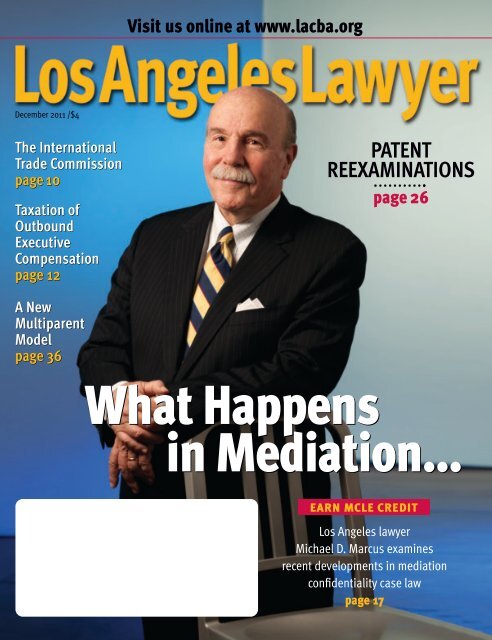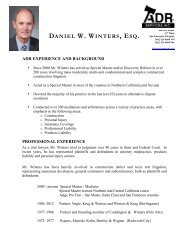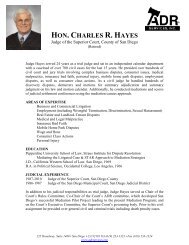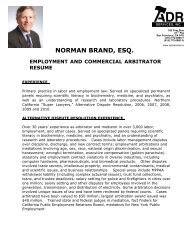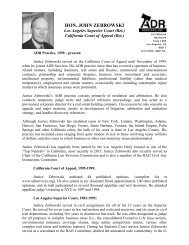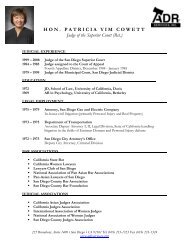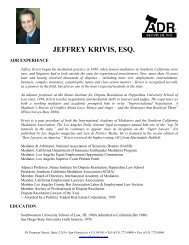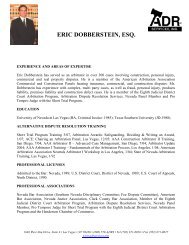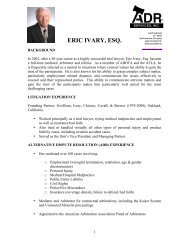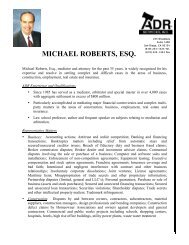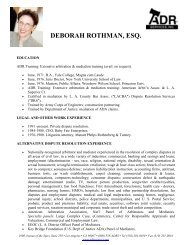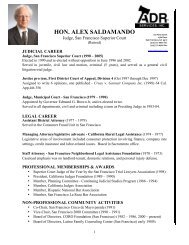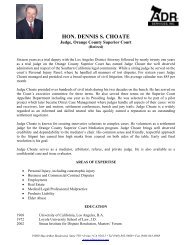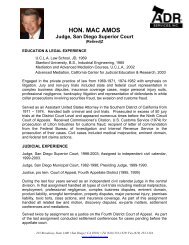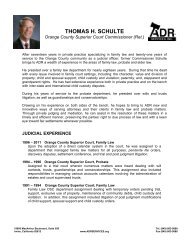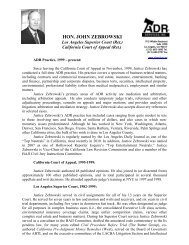Los Angeles Lawyer Article - ADR Services, Inc.
Los Angeles Lawyer Article - ADR Services, Inc.
Los Angeles Lawyer Article - ADR Services, Inc.
Create successful ePaper yourself
Turn your PDF publications into a flip-book with our unique Google optimized e-Paper software.
Visit us online at www.lacba.org<br />
December 2011 /$4<br />
The International<br />
Trade Commission<br />
page 10<br />
Taxation of<br />
Outbound<br />
Executive<br />
Compensation<br />
page 12<br />
PATENT<br />
REEXAMINATIONS<br />
page 26<br />
A New<br />
Multiparent<br />
Model<br />
page 36<br />
What Happens<br />
in Mediation...<br />
EARN MCLE CREDIT<br />
<strong>Los</strong> <strong>Angeles</strong> lawyer<br />
Michael D. Marcus examines<br />
recent developments in mediation<br />
confidentiality case law<br />
page 17
MCLE ARTICLE AND SELF-ASSESSMENT TEST<br />
By reading this article and answering the accompanying test questions, you can earn one MCLE credit.<br />
To apply for credit, please follow the instructions on the test answer sheet on page 19.<br />
by Judge Michael D. Marcus (ret.)<br />
What Happens in<br />
MEDIATION...<br />
Courts have carved out only very rare<br />
exceptions to mediation confidentiality<br />
CONFIDENTIALITY dominates the mediation process in California.<br />
With rare exceptions, all writings and statements prepared for and<br />
made at mediation cannot be divulged. Confidentiality is a cornerstone<br />
of mediation because it enables all participants to discuss<br />
openly the legal and factual elements of their cases without consequence<br />
or detriment. 1<br />
Along with the clear advantages of confidentiality, however, are<br />
its less obvious and sometimes criticized byproducts, including the protection<br />
of misconduct and incompetence. Indeed, while an attorney<br />
is constrained from misleading a judicial officer 2 or opposing attorney,<br />
3 misrepresentations to neutrals or other mediation participants<br />
are not subject to either sanctions or discipline. 4 The interpretation<br />
by courts of the scope of mediation confidentiality thus carries high<br />
stakes for all involved. As a result, practitioners should be aware of<br />
recent decisions by the California Supreme Court and a Ninth Circuit<br />
Court of Appeals case to fully grasp the current breadth of confidentiality<br />
applicable to mediation.<br />
Mediation confidentiality in California’s state courts derives from<br />
the California Evidence Code, 5 which states that every communication,<br />
whether oral or in writing, that was “made for the purpose of,<br />
in the course of, or pursuant to mediation” is confidential and not<br />
admissible at any subsequent proceeding or subject to discovery. 6 The<br />
source of mediation confidentiality in California’s federal courts is<br />
based on local rules as well as case law and is thus more nuanced. 7<br />
The California Supreme Court’s 2001 decision in Foxgate<br />
Homeowners’ Association, <strong>Inc</strong>. v. Bramalea California, <strong>Inc</strong>., is the<br />
natural starting point for an analysis of mediation confidentiality in<br />
California state courts. In Foxgate, the supreme court held that pursuant<br />
to Evidence Code Sections 1119 and 1121, a mediator may not<br />
report attorney misconduct or bad faith to a jurist with the underlying<br />
case on his or her calendar. According to the Foxgate court,<br />
“Neither a mediator nor a party may reveal communications made<br />
during mediation.” Moreover, Section 1121 prohibits mediators<br />
“and anyone else from submitting a document that reveal[s] communications<br />
during mediation and [bars] the court from considering<br />
them.” 8 The opinion further held that:<br />
Although a party may report obstructive conduct to the court,<br />
Michael D. Marcus, a retired judge of the State Bar Court, is a mediator,<br />
arbitrator, and discovery referee with <strong>ADR</strong> <strong>Services</strong>, <strong>Inc</strong>. He specializes in the<br />
resolution of employment, commercial/business, personal injury, real property,<br />
legal malpractice, and medical malpractice cases.<br />
<strong>Los</strong> <strong>Angeles</strong> <strong>Lawyer</strong> December 2011 17
none of the confidentiality statutes currently make an exception<br />
for reporting bad faith conduct or for imposition of sanctions<br />
under that section when doing so would require disclosure<br />
of communications or a mediator’s assessment of a party’s<br />
conduct although the Legislature presumably is aware that Code<br />
of Civil Procedure section 128.5 permits imposition of sanctions<br />
when similar conduct occurs during trial proceedings. 9<br />
The court elaborated on that point in an extensive footnote, stating<br />
in part that:<br />
The conflict between the policy of preserving confidentiality of<br />
mediation in order to encourage resolution of disputes and the<br />
interest of the state in enforcing professional responsibility to<br />
protect the integrity of the judiciary and to protect the public<br />
against incompetent and/or unscrupulous attorneys has not gone<br />
unrecognized. (Citations omitted.) As noted, however, any<br />
resolution of the competing policies is a matter for legislative,<br />
not judicial, action.<br />
Therefore, we do not agree with the Court of Appeal that<br />
the court may fashion an exception for bad faith in mediation<br />
because failure to authorize reporting of such conduct during<br />
mediation may lead to “an absurd result” or fail to carry out<br />
the legislative policy of encouraging mediation…. 10<br />
The Foxgate court recognized, however, that occasionally it is necessary<br />
for courts to create a judicial exception to a statute to avoid<br />
“an absurd result.” 11 Nevertheless, this was not required by the<br />
facts in Foxgate because Evidence Code Section 1119—which prohibits<br />
any person from revealing any written or oral communication<br />
made at mediation—and Section 1121—which prohibits mediators<br />
from advising the court about conduct during the mediation—were<br />
clear and unambiguous. 12<br />
A logical extension of Foxgate is Rojas v. Superior Court, 13 in<br />
which the supreme court in 2003 extended confidentiality to all<br />
writings, including exhibits, prepared for mediation. For example, a<br />
document created for mediation that summarizes a plaintiff’s damages<br />
is protected, while a summary of the same damages prepared by<br />
a company bookkeeper during the course of the business’s operation<br />
is not.<br />
The enforceability of mediation settlements was the supreme<br />
court’s focus in Fair v. Bakhtiari, 14 a 2006 decision that discusses the<br />
language required to make a written settlement enforceable pursuant<br />
to Evidence Code Section 1123(b). Subdivision (b) states that<br />
a settlement agreement is enforceable if it “provides that it is enforceable<br />
or binding or words to that effect.” The court concluded that<br />
the arbitration provision in the settlement at issue—with the language<br />
“Any and all disputes subject to JAMS (Judicial Arbitration and<br />
Mediation <strong>Services</strong>) arbitration rules”—did not comply with Section<br />
1123(b) because it did not include a “direct statement to the effect<br />
that [the settlement] is enforceable or binding.” The Fair court<br />
explained that the legislature’s goal in drafting the phrase “words to<br />
that effect” was to allow the parties to use nonlegalistic terms to<br />
express their intent. 15 To effect that legislative aim and not erode confidentiality,<br />
Fair concludes that a writing, to satisfy the “words to that<br />
effect” provision, “must directly express the parties’ agreement to be<br />
bound by the document they sign.” 16 The arbitration provision at issue<br />
did not express that intent.<br />
Due Process Exception<br />
Simmons v. Ghaderi, 17 a decision by the supreme court in 2008, qualifies<br />
Foxgate, Rojas, and Fair’s strict interpretation of mediation<br />
confidentiality. In rejecting a challenge to mediation confidentiality,<br />
the Simmons court held that due process is the only judicially crafted<br />
exception to strict application of mediation confidentiality in the<br />
absence of legislative action.<br />
The court in Simmons noted, as the Foxgate court had also<br />
observed, that “judicial construction of unambiguous statutes is<br />
appropriate only when literal interpretation would yield absurd<br />
results.” 18 The court rejected the argument that a party, over the objection<br />
of an opposing party, can enforce an oral settlement agreement<br />
at mediation pursuant to a breach-of-contract theory. Moreover,<br />
since estoppel and waiver of mediation confidentiality were contrary<br />
to legislative intent, the Simmons court held that they cannot<br />
be adopted as judicial exceptions to the mediation statutes. 19<br />
In recognizing the due process exception to confidentiality,<br />
Simmons cites, with approval, Rinaker v. Superior Court. 20 The<br />
court of appeal in Rinaker compelled a mediator to testify at a juvenile<br />
delinquency proceeding regarding statements by the victim at a<br />
related mediation about the identities of the juveniles. The court<br />
found that a minor’s due process right of confrontation outweighs the<br />
right of confidentiality. 21<br />
The federal counterpart to Rinaker is Olam v. Congress Mortgage<br />
Company, 22 which holds that a mediator’s testimony can be compelled<br />
in a civil proceeding to establish whether a defaulting party was<br />
competent to enter into a settlement agreement that the opposing party<br />
is seeking to enforce. Foxgate factually distinguishes Olam because<br />
the parties in Foxgate had waived confidentiality. Otherwise, Foxgate<br />
acknowledges Olam as a comprehensive discussion of mediation<br />
law. 23<br />
Both Rinaker and Olam explain the process that a trial court should<br />
use to decide whether or not to compel a mediator’s testimony.<br />
Rinaker states that a court should conduct an in camera hearing “to<br />
weigh the public’s interest in maintaining the confidentiality of mediation<br />
against the minors’ constitutionally based claim of need for the<br />
testimony, and to determine whether the minors have established that<br />
the mediator’s testimony is necessary to vindicate their right of confrontation.”<br />
24 For example, the mediator would be excused from testifying<br />
in open court if he or she could not recall the statement<br />
needed to impeach the witness. 25 Also, the in camera process allows<br />
the trial court to assess the probative value of the mediator’s testimony.<br />
26 Rinaker rejects the suggestion that the moving party should<br />
be required to demonstrate that “there is no other evidence, unrelated<br />
to the mediation, which could be used to undermine” the testimony<br />
of the witness to be impeached. 27<br />
If a plaintiff is claiming undue influence at the mediation and seeking<br />
the voiding of the settlement, Olam, relying on Rinaker, allows<br />
the mediator to first testify in closed proceedings regarding the plaintiff’s<br />
statements at mediation. 28 Like Foxgate, Olam notes that<br />
Evidence Code Section 703.5 confers on the mediator an independent<br />
privilege not to testify about statements or conduct in the mediation—<br />
and that Rinaker does not focus on that provision. The mediator in<br />
Rinaker had objected to testifying only on the basis of Evidence<br />
Code Section 1119, not Section 703.5. 29<br />
Olam posits a two-step approach for balancing the requirements<br />
of confidentiality and due process. According to the Olam court:<br />
[The goal of the first step] is to determine whether the harm<br />
that would be done to the values that underlie the mediation<br />
privileges simply by ordering the mediator to participate in the<br />
in camera proceedings can be justified by the prospect that (the<br />
mediator’s) testimony might well make a singular and substantial<br />
contribution to protecting or advancing competing interests<br />
of comparable or greater magnitude. 30<br />
In the second step, the court should weigh and assess:<br />
(1) the importance of the values and interests that would be<br />
harmed if the mediator was compelled to testify (perhaps subject<br />
to a sealing or protective order, if appropriate), (2) the magnitude<br />
of the harm that compelling the testimony would cause<br />
to those values and interests, (3) the importance of the rights<br />
or interests that would be jeopardized if the mediator’s testimony<br />
was not accessible in the specific proceedings in question,<br />
18 <strong>Los</strong> <strong>Angeles</strong> <strong>Lawyer</strong> December 2011
MCLE Test No. 209<br />
MCLE Answer Sheet #209<br />
WHAT HAPPENS IN MEDIATION...<br />
The <strong>Los</strong> <strong>Angeles</strong> County Bar Association certifies that this activity has been approved for Minimum<br />
Continuing Legal Education credit by the State Bar of California in the amount of 1 hour.<br />
Name<br />
Law Firm/Organization<br />
1. Mediation confidentiality in California’s state courts<br />
is a product of both statute and case law.<br />
True.<br />
False.<br />
2. The basis for mediation confidentiality in California’s<br />
federal courts is found only in the Federal Rules of<br />
Evidence and not in common law.<br />
True.<br />
False.<br />
3. Mediation confidentiality in California’s state courts<br />
is absolute, with no exceptions.<br />
True.<br />
False.<br />
4. A mediator may not report an attorney who misbehaves<br />
at the mediation to the superior court judge<br />
who has the underlying case on his or her calendar.<br />
True.<br />
False.<br />
5. Mediation confidentiality prevents a mediator from<br />
reporting the failure of an attorney or party to attend a<br />
mediation to the superior court judge who has the<br />
underlying case on his or her calendar.<br />
True.<br />
False.<br />
6. Mediation confidentiality allows attorneys to misrepresent<br />
facts and law to mediators and opposing<br />
counsel at the mediation.<br />
True.<br />
False.<br />
7. A diagram drawn by a witness to an accident at the<br />
time of the accident becomes confidential if referred to<br />
or used by an attorney at a mediation.<br />
True.<br />
False.<br />
8. A diagram drawn at a mediation by a witness to an<br />
accident is protected by mediation confidentiality.<br />
True.<br />
False.<br />
9. A mediator’s testimony about statements or conduct<br />
by parties at a mediation regarding whether one<br />
of the parties was competent to enter into the settlement<br />
agreement can be compelled in a federal<br />
civil proceeding to enforce the mediation settlement<br />
agreement.<br />
True.<br />
False.<br />
10. When attempting to enforce a mediation settlement<br />
in state court, a party must show that the parties<br />
had expressly waived mediation confidentiality pursuant<br />
to language in the Evidence Code.<br />
True.<br />
False.<br />
11. Mediation confidentiality protects attorneys in state<br />
court from being sued for legal malpractice by their<br />
clients for anything they said or did during a mediation.<br />
True.<br />
False.<br />
12. Mediation confidentiality does not apply to communications<br />
between clients and their attorneys that<br />
were made outside the presence of the mediator and<br />
opposing counsel.<br />
True.<br />
False.<br />
13. Communications between clients and their attorneys<br />
before the commencement of a mediation are<br />
not confidential.<br />
True.<br />
False.<br />
14. In Cassel v. Superior Court, the California Supreme<br />
Court invited the state legislature to reverse the court’s<br />
holding that mediation confidentiality applies to all<br />
communications made at mediation, including those<br />
that may involve legal malpractice.<br />
True.<br />
False.<br />
15. Like the state courts, California’s federal district<br />
courts strictly apply confidentiality to all communications<br />
and writings made during a mediation.<br />
True.<br />
False.<br />
16. Despite the fact that federal courts are authorized<br />
to establish rules regarding dispute resolution, a recent<br />
decision makes it doubtful that they have the authority<br />
to create their own local rules concerning mediation<br />
confidentiality.<br />
True.<br />
False.<br />
17. Parties engaged in court-ordered and private mediations<br />
in federal court proceedings can negotiate for the<br />
total confidentiality of mediation communications.<br />
True.<br />
False.<br />
18. Communications in state court mediations conducted<br />
by court-connected or appointed mediators are<br />
as confidential as communications in private mediations.<br />
True.<br />
False.<br />
19. California’s attorney-client privilege in the Evidence<br />
Code is a further basis for protecting attorney-client communications<br />
at mediations.<br />
True.<br />
False.<br />
20. Evidence Code Section 703.5 confers on a mediator<br />
an independent privilege not to testify about statements<br />
or conduct by parties at a mediation.<br />
True.<br />
False.<br />
Address<br />
City<br />
State/Zip<br />
E-mail<br />
Phone<br />
State Bar #<br />
INSTRUCTIONS FOR OBTAINING MCLE CREDITS<br />
1. Study the MCLE article in this issue.<br />
2. Answer the test questions opposite by marking<br />
the appropriate boxes below. Each question<br />
has only one answer. Photocopies of this<br />
answer sheet may be submitted; however, this<br />
form should not be enlarged or reduced.<br />
3. Mail the answer sheet and the $20 testing fee<br />
($25 for non-LACBA members) to:<br />
<strong>Los</strong> <strong>Angeles</strong> <strong>Lawyer</strong><br />
MCLE Test<br />
P.O. Box 55020<br />
<strong>Los</strong> <strong>Angeles</strong>, CA 90055<br />
Make checks payable to <strong>Los</strong> <strong>Angeles</strong> <strong>Lawyer</strong>.<br />
4. Within six weeks, <strong>Los</strong> <strong>Angeles</strong> <strong>Lawyer</strong> will<br />
return your test with the correct answers, a<br />
rationale for the correct answers, and a<br />
certificate verifying the MCLE credit you earned<br />
through this self-assessment activity.<br />
5. For future reference, please retain the MCLE<br />
test materials returned to you.<br />
ANSWERS<br />
Mark your answers to the test by checking the<br />
appropriate boxes below. Each question has only<br />
one answer.<br />
1. ■ True ■ False<br />
2. ■ True ■ False<br />
3. ■ True ■ False<br />
4. ■ True ■ False<br />
5. ■ True ■ False<br />
6. ■ True ■ False<br />
7. ■ True ■ False<br />
8. ■ True ■ False<br />
9. ■ True ■ False<br />
10. ■ True ■ False<br />
11. ■ True ■ False<br />
12. ■ True ■ False<br />
13. ■ True ■ False<br />
14. ■ True ■ False<br />
15. ■ True ■ False<br />
16. ■ True ■ False<br />
17. ■ True ■ False<br />
18. ■ True ■ False<br />
19. ■ True ■ False<br />
20. ■ True ■ False<br />
<strong>Los</strong> <strong>Angeles</strong> <strong>Lawyer</strong> December 2011 19
and (4) how much the testimony would contribute toward protecting<br />
those rights or advancing those interests—an inquiry<br />
that includes, among other things, an assessment of whether<br />
there are alternative sources of evidence of comparable probative<br />
value. 31<br />
Rinaker and Olam are applicable when 1) a party to a mediation<br />
settlement agreement, in which all of the parties have expressly waived<br />
mediation confidentiality, wants the mediator to testify as to what took<br />
place at the mediation, and 2) a due process violation might occur if<br />
mediation confidentiality were to prevent a mediator’s testimony.<br />
This year, Cassel v. Superior Court reaffirmed the scope of mediation<br />
confidentiality in California’s state courts. 35 The California Supreme<br />
Court was faced with two clear options—continue to hold that mediation<br />
confidentiality should be liberally construed despite the surrounding<br />
circumstances, or find that confidentiality should not be used<br />
to shield negligent attorneys from malpractice suits. The court chose<br />
to stay the course and held that mediation confidentiality has few<br />
exceptions.<br />
In Cassel, the plaintiff filed a complaint against his former attorneys<br />
for breaching their professional, fiduciary, and contractual<br />
duties. The plaintiff claimed that the defendants forced him to settle<br />
a case through the use of bad advice, deception, and coercion. To prove<br />
his case, Cassel wanted to introduce as evidence his conversations with<br />
his attorneys immediately preceding and at the mediation. The trial<br />
court ruled that these discussions were inadmissible. The court of<br />
appeal granted mandamus relief, reasoning that mediation confidentiality<br />
statutes are not intended to prevent a client from using communications<br />
with his or her lawyer outside the presence of all other<br />
mediation participants in a legal malpractice case against the lawyer.<br />
Cassel begins with a reminder that the legislature has provided only<br />
one exception to mediation confidentiality—an express waiver by the<br />
participants. Moreover, the judicially crafted exceptions are only<br />
available when “due process is implicated, or where literal construction<br />
would produce absurd results, thus clearly violating the<br />
Legislature’s presumed intent.” 36 The court reviewed Foxgate, Rojas,<br />
Fair, and Simmons—cases that, collectively, are authority for the broad<br />
application of mediation confidentiality. 37 With these decisions as a<br />
The court reasoned that the attorney-client privilege and mediation<br />
confidentiality statutes achieve separate and unrelated purposes.<br />
The former “allows the client to consult frankly with counsel on<br />
any matter, without fear that others” may use these confidences,<br />
whereas the latter “serve the public policy of encouraging the<br />
resolution of disputes by means short of litigation.”<br />
As the supreme court noted in Simmons v. Ghaderi, 32 parties<br />
seeking the trial court’s assistance in enforcing a settlement may<br />
avoid mediation confidentiality by expressly waiving its application.<br />
According to Evidence Code Section 1122(a)(1) and (2), a mediation<br />
writing is admissible if all participants agree to its disclosure and it<br />
does not reveal anything said or done during the mediation. To be<br />
valid, the waiver must be clear and unambiguous. Thus, a mediation<br />
settlement agreement should incorporate the language of Evidence<br />
Code Section 1123(a), (b) and (c) and state either that the agreement<br />
“provides that it is admissible or subject to disclosure…,” is “enforceable<br />
or binding…,” or “all parties to the agreement expressly agree<br />
in writing, or orally in accordance with Section 1118, to disclosure<br />
of the agreement.” 33<br />
Thus Foxgate and its progeny allow attorneys and mediators to<br />
report to the trial court the failure of an attorney or party to appear<br />
at a mediation. However, unless disclosure is permitted by consent<br />
of the parties or required to uphold a due process right, all communications<br />
during the mediation process, no matter how scurrilous or<br />
misleading, are confidential in California’s state courts—until the legislature<br />
states otherwise. 34<br />
The Impact of Cassel<br />
foundation for its ruling, the Cassel court held that the purpose of<br />
Evidence Code Section 1119(a)—which provides that “[n]o evidence<br />
of anything said or any admission made for the purpose of, in the<br />
course of, or pursuant to, a mediation…is admissible or subject to discovery…”—extends<br />
to all oral communications at a mediation, even<br />
if they only take place between parties and their own attorneys. 38<br />
The Cassel court also found that the plaintiff’s discussions with<br />
his attorneys before the mediation concerning mediation strategy and<br />
settlement were confidential because Section 1119(a) and (b) applies<br />
to all utterances and writings “for the purpose of, in the course of,<br />
or pursuant to, a mediation.” Instead of attempting to create a<br />
bright-line test for establishing when a pre- or post-mediation utterance<br />
or writing is related to mediation and thus confidential, the court<br />
simply held that the plaintiff’s discussions with his attorneys came<br />
within the statute because they “concerned the settlement strategy to<br />
be pursued at an immediately pending mediation…[and] were closely<br />
related to the mediation in time, context, and subject matter.…” 39<br />
The court in Cassel notes that the mediation confidentiality<br />
statutes are unlike Evidence Code Section 958—which eliminates confidentiality<br />
protections otherwise afforded by the attorney-client<br />
privilege in suits between clients and their lawyers—because the<br />
mediation confidentiality statutes contain no exception for legal malpractice<br />
actions. The court reasoned that the attorney-client privilege<br />
and mediation confidentiality statutes achieve separate and unrelated<br />
purposes. The former “allows the client to consult frankly<br />
with counsel on any matter, without fear that others” may use these<br />
confidences, whereas the latter “serve the public policy of encouraging<br />
the resolution of disputes by means short of litigation.” 40<br />
The Cassel court also discussed the nonapplicability of the due<br />
process exception and the more general “absurd result” test to the<br />
facts before it. Due process was not a factor because “the mere loss<br />
of evidence” in a lawsuit for civil damages does not implicate a fundamental<br />
interest. Nor did the result produced by applying the plain<br />
terms of the statutes to the facts of the case create a result that was<br />
absurd or clearly contrary to legislative intent. 41<br />
In sum, the Cassel court reversed the appellate court judgment and<br />
left the plaintiff with the inability to introduce evidence of his attorneys’<br />
alleged misconduct immediately prior to and at the mediation.<br />
The short-term impact of Cassell’s extensive analysis should foreclose<br />
20 <strong>Los</strong> <strong>Angeles</strong> <strong>Lawyer</strong> December 2011
EXPERT WITNESS CONSTRUCTION<br />
41 YEARS<br />
CONSTRUCTION<br />
EXPERIENCE<br />
SPECIALTIES:<br />
• Lawsuit Preparation/Residential<br />
Construction • Single and Multi-family,<br />
Hillside Construction • Foundations<br />
• Vibration Trespass • Concrete • Floors<br />
• Tile • Stone • Retaining Walls •<br />
Waterproofing • Water Damages • Roofing<br />
• Sheet Metal • Carpentry/Rough Framing<br />
• Stairs • Materials/Costs • Building Codes<br />
• Construction Contracts<br />
CIVIL EXPERIENCE:<br />
Construction defect cases for insurance<br />
companies and attorneys since 1992<br />
COOK<br />
CONSTRUCTION<br />
COMPANY<br />
Stephen M. Cook<br />
California Contractors License B431852<br />
Graduate study in Construction<br />
L.A. Business College, 1972<br />
TEL 818.438.4535 FAX 818.595.0028<br />
EMAIL scook16121@aol.com<br />
7131 Owensmouth Ave., Canoga Park, CA 91303<br />
VIGOROUS<br />
STATE BAR DEFENSE<br />
JAMES R. DIFRANK<br />
A PROFESSIONAL LAW CORP.<br />
TEL 562.789.7734<br />
www.BarDefense.net<br />
E-MAIL DiFrank98@aol.com<br />
• Disciplinary Defense<br />
• Reinstatements<br />
• Bar Admissions<br />
• Moral Character<br />
• Criminal Defense<br />
• Representation within the<br />
State of California<br />
FORMER:<br />
State Bar Sr. Prosecutor<br />
Sr. State Bar Court Counsel<br />
Home of Sir Winston<br />
Pictured Above<br />
further lower court attempts to carve exceptions<br />
to mediation confidentiality. This effect<br />
may not last too long, however. While the<br />
court chose not to create a bright-line rule<br />
allowing clients to use communications with<br />
their attorneys at mediations in subsequent<br />
malpractice actions, it unambiguously invited<br />
the legislature to do so: “Of course, the Legislature<br />
is free to reconsider whether the mediation<br />
confidentiality statutes should preclude<br />
the use of mediation-related attorney-client<br />
discussions to support a client’s civil claims<br />
of malpractice against his or her attorneys.” 42<br />
This far-from-subtle invitation may be hard<br />
for the legislature to ignore, especially if it also<br />
considers Justice Ming Chin’s reluctant concurrence<br />
that shielding attorneys from being<br />
held accountable for their incompetent or<br />
fraudulent actions during mediation “is a<br />
high price to pay to preserve total confidentiality<br />
in the mediation process.” 43<br />
The Ninth Circuit<br />
The federal district courts and court of appeals<br />
in the Ninth Circuit take a different approach<br />
toward mediation confidentiality than do California’s<br />
state courts. With no federal statute<br />
governing the concept, each of the four federal<br />
districts have adopted their own local<br />
rules. 44 For example, in a commentary to its<br />
local rules regarding mediation, the Northern<br />
District—while relying, in part, on Foxgate,<br />
Rojas, and Simmons—noted that the concept<br />
of absolute mediation confidentiality may be<br />
excused in “limited circumstances in which the<br />
need for disclosure outweighs the confidentiality<br />
of a mediation.” These circumstances<br />
include threats of death or substantial bodily<br />
injury, the use of the mediation to commit a<br />
felony, and the right to cross-examination in<br />
a quasi-criminal proceeding. 45<br />
The Eastern District provides that all communications<br />
during that court’s Voluntary<br />
Dispute Resolution Program (VDRP), except<br />
as otherwise required by law or stipulated in<br />
writing by all parties and the neutral, are<br />
privileged and confidential. 46 One exception<br />
to confidentiality in the Eastern District is that<br />
a communication may be disclosed to the<br />
assigned judge if “ordered by the court—<br />
after application of pertinent legal tests that<br />
are appropriately sensitive to the interests<br />
underlying VDRP confidentiality—in connection<br />
with a proceeding to determine:<br />
whether a person violated a legal norm, rule,<br />
court order, or ethical duty during or in connection<br />
with the VDRP session.” 47 The<br />
Eastern District local rules do not apply to<br />
mediation proceedings conducted outside<br />
the court’s VDRP unless stipulated to by the<br />
parties. 48<br />
The Central District has proposed that<br />
courts, mediators, all counsel, and other persons<br />
attending mediations “shall treat as<br />
‘confidential information’ the contents of<br />
the written mediation statements, any documents<br />
prepared for the purpose of, in the<br />
course of, or pursuant to the mediation, anything<br />
that happened or was said relating to<br />
the subject matter of the case in mediation,<br />
any position taken, and any view of the merits<br />
of the case expressed by any participant<br />
in connection with any mediation.” 49 The<br />
Southern District protects “[a]ll proceedings<br />
of the mediation conference, including any<br />
statement made by any party, attorney or<br />
other participant.” 50<br />
The mediation confidentiality rules fashioned<br />
by the district courts in the Ninth<br />
Circuit were recently tested in the well-publicized<br />
case of The Facebook, <strong>Inc</strong>. v. Pacific<br />
Northwest Software, <strong>Inc</strong>. 51 In that case, twins<br />
Cameron and Tyler Winklevoss and Divya<br />
Narendra sued Mark Zuckerberg, Facebook’s<br />
founder, for allegedly stealing the Facebook<br />
concept from them. In turn, Facebook sued<br />
the Winklevosses and Narendra. A Northern<br />
District Court judge ordered everyone into<br />
mediation, during which the participants<br />
signed a confidentiality agreement stipulating<br />
that all statements made during the process<br />
were privileged, nondiscoverable, and inadmissible<br />
“in any arbitral, judicial, or other<br />
proceeding.”<br />
In the mediation, the parties entered into<br />
a written settlement, with the Winklevosses<br />
and Narendra agreeing to give up their competing<br />
company for cash and an interest in<br />
Facebook. Facebook filed a motion seeking<br />
to enforce the settlement after negotiations<br />
over the form of the final deal documents<br />
fell apart. The Winklevosses and Narendra<br />
argued that the settlement agreement was<br />
unenforceable because it lacked certain material<br />
terms and had been procured by fraud.<br />
The district court found the settlement<br />
agreement enforceable, in part, because what<br />
was said and not said during the mediation<br />
was excluded under the Northern District’s<br />
Alternative Dispute Resolution Local Rule 6-<br />
11. Because there are no federal rules or statutes<br />
concerning mediation confidentiality,<br />
California’s federal district courts have adopted<br />
their own approaches to the matter. The<br />
court found that the rule creates a “privilege”<br />
for “evidence regarding the details of the<br />
parties’ negotiations in their mediation.” 52<br />
On appeal, Ninth Circuit Court of Appeals<br />
Chief Judge Alex Kozinski, writing for<br />
a unanimous court, affirmed the exclusion of<br />
the alleged mediation misrepresentations—but<br />
with reasoning that differs from the California<br />
Supreme Court’s approach to the issue.<br />
Facebook undercuts the effectiveness of the<br />
district courts’ local rules: “It’s doubtful that<br />
a district court can augment the list of [federally<br />
created] privileges by local rule.” 53<br />
The court then proceeded to sidestep this<br />
22 <strong>Los</strong> <strong>Angeles</strong> <strong>Lawyer</strong> December 2011
conundrum of its own making by holding that<br />
the local rules did not apply because the parties<br />
had used a private mediator. 54<br />
The Ninth Circuit further held in Facebook<br />
that the district court had been right to<br />
exclude the proffered evidence because the<br />
parties’ confidentiality agreement provided<br />
that all statements made during the course of<br />
the mediation were privileged settlement discussions<br />
and inadmissible for any purpose,<br />
including in any legal proceeding. 55 Accordingly,<br />
the Ninth Circuit affirmed that the<br />
Winklevosses and Narendra had been properly<br />
prohibited from introducing evidence of<br />
any alleged mediation misrepresentations. 56<br />
Facebook unambiguously holds that parties<br />
in federal proceedings, when involved in<br />
private mediations, can negotiate for the total<br />
confidentiality of mediation communications.<br />
Less clear is the status of confidentiality in<br />
federal courts in the Ninth Circuit for mediations<br />
conducted by court-appointed neutrals.<br />
Added to this confusion is that each of<br />
the Ninth Circuit’s four district courts has its<br />
own approach to confidentiality. In contrast,<br />
the mediation communications in Facebook<br />
would have been absolutely confidential in a<br />
California state court whether the mediator<br />
had been privately retained or court appointed<br />
and whether or not the parties had agreed in<br />
writing to apply confidentiality to all court<br />
proceedings—as long as the parties had complied<br />
with the requirements of Evidence Code<br />
Sections 1122 and 1123.<br />
For now, practitioners in California state<br />
courts should know that the exceptions to<br />
mediation confidentiality are rare. However,<br />
the California Supreme Court in Cassel has<br />
invited the state legislature to revise the mediation<br />
confidentiality statutes so that they do<br />
not protect acts of legal malpractice. Practitioners<br />
in the federal courts in California<br />
should be aware that, in the absence of a<br />
controlling statute, the courts’ approach to<br />
mediation confidentiality is more ad hoc. ■<br />
1 Foxgate Homeowners’ Ass’n, <strong>Inc</strong>. v. Bramalea Cal.,<br />
<strong>Inc</strong>., 26 Cal. 4th 1, 14 (2001); Simmons v. Ghaderi, 44<br />
Cal. 4th 570, 578 (2008); Cassel v. Superior Court, 51<br />
Cal. 4th 113, 124 (2011).<br />
2 BUS. & PROF. CODE §6068(d); CAL. RULES OF PROF’L<br />
CONDUCT R. 5-200 (B).<br />
3<br />
In the Matter of Katz, 3 Cal. State Bar Ct. Rptr.<br />
430, 435 (Review Dept. 1995).<br />
4<br />
Foxgate, 26 Cal. 4th at 13.<br />
5 EVID. CODE §§1115 et seq.<br />
6 EVID. CODE §1119.<br />
7 See the Alternative Dispute Resolution Act of 1998,<br />
28 U.S.C. §651(b). The act gives U.S. district courts the<br />
right to authorize, by local rule, the use of alternative<br />
dispute processes in all civil actions.<br />
8 Foxgate, 26 Cal. 4th at 13.<br />
9<br />
Id. at 17.<br />
10<br />
Id. at n.13.<br />
11<br />
Id. at 14.<br />
12<br />
Id.<br />
13<br />
Rojas v. Superior Court, 33 Cal. 4th 407 (2003).<br />
14<br />
Fair v. Bakhtiari, 40 Cal. 4th 189 (2006).<br />
Anita Rae Shapiro<br />
SUPERIOR COURT COMMISSIONER, RET.<br />
PRIVATE DISPUTE RESOLUTION<br />
PROBATE, CIVIL, FAMILY LAW<br />
PROBATE EXPERT WITNESS<br />
TEL/FAX: (714) 529-0415 CELL/PAGER: (714) 606-2649<br />
E-MAIL: PrivateJudge@adr-shapiro.com<br />
http://adr-shapiro.com<br />
GREG DAVID DERIN - MEDIATOR & ARBITRATOR<br />
HONESTY • FAIRNESS • COMMITMENT • CREATIVITY • EXCELLENCE<br />
• Entertainment and<br />
Intellectual Property<br />
• Employment<br />
AREAS OF EXPERTISE:<br />
• Contract and Business Torts<br />
• Real Property<br />
• Corporate and Partnership<br />
“POWER MEDIATOR”, The Hollywood Reporter, <strong>ADR</strong> Super<strong>Lawyer</strong> TM<br />
FACULTY, Harvard Negotiation Institute<br />
310.552.1062 ■ www.derin.com<br />
1925 CENTURY PARK EAST, LOS ANGELES, CALIFORNIA 90067<br />
<strong>Los</strong> <strong>Angeles</strong> <strong>Lawyer</strong> December 2011 23


